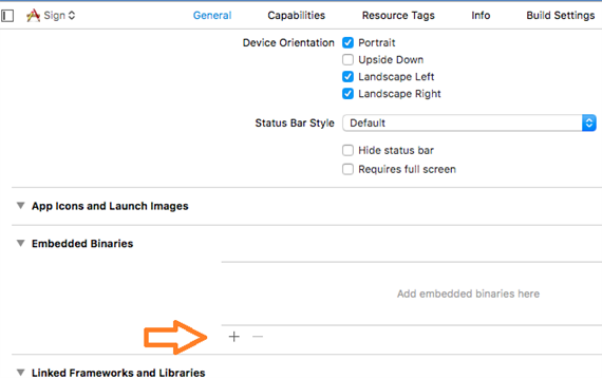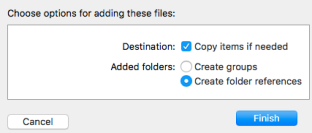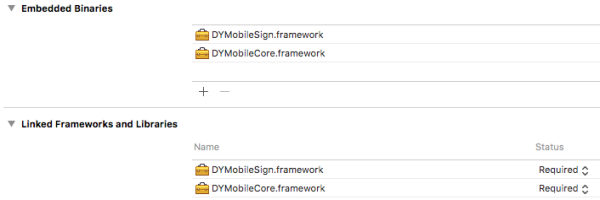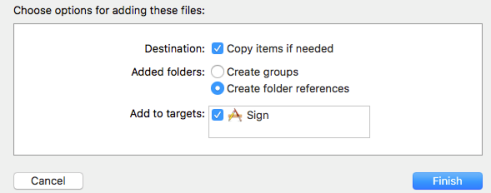Installation
System Requirements
- Apple iPhone/iPad - iOS 8 and later
- Apple Watch – Watch OS 2.0 and later
Install Unbound Crypto-of-Things SDK
Obtain the Unbound SDK for iOS from Unbound.
Extract content from the package, noting the path to the folder where the files are stored. Unbound Crypto-of-Things SDK *.framework files are forwarded to the root directory.
Notes
- Unbound Crypto-of-Things SDK framework modules allow you to hand-pick the minimal set that is required for your use case(s).
- Different files are required if you are using a static framework or a dynamic framework. Make sure that you have the correct package corresponding to your framework type.
| Framework File | Description |
|---|---|
| iOS Apps | |
|
DYMobileCore.framework |
This module is required. Make sure that you use the dynamic or static framework, depending on your implementation. |
| DYMobilePWD.framework | Enables use of password tokens. |
|
DYMobileSign.framework |
Enables use of signing tokens. Make sure that you use the dynamic or static framework, depending on your implementation. |
| DYMobileEnc.framework | Enables use of encryption tokens. |
| DYMobileOTP.framework | Enables use of OTP |
| openssl.framework | Required when using the static framework. |
| iOS Watch Apps | |
|
DYMobileCoreWatchOS.framework |
This module is required. |
| DYMobileOTPWatchOS.framework | Enables use of OTP |
Other entries of the package are organized in the subfolders of the current directory as follows:
| Subfolder | Description |
|---|---|
| without simulator |
A folder with Unbound Crypto-of-Things SDK Framework modules for iOS stripped from simulator objects (an iTunes-friendly version of the Unbound Crypto-of-Things SDK). |
| samples |
A folder with code samples for the use cases. |
| doc | Start from the index.html file. |
Open your project in Xcode and click the General tag.

Add the required file:
- Dynamic framework: Click the ”+” icon in the Embedded Binaries section and select the Core framework file.
- Static framework: Click the ”+” icon in the Linked Frameworks and Libraries section and select the Core framework file.
Make sure to mark the Destination: Copy items if needed and click Finish.

Repeat the two previous steps choosing the framework files that support your use case.
For example, the following set is used in dynamic signing applications.

Note
If you are implementing the static framework, you must also add -ObjC -lstdc++ to the Other Linker Flags in the Build Settings tab.
Note
If you switch from the embedded to static framework, you must remove DYMobileCore.framework and DYMobileSign.framework from the Embedded Binaries section.
Add the Certificate
The Unbound Crypto-of-Things SDK uses a public key to encrypt the data it is sending to the CoT![]() Crypto-of-Things (CoT) - Unbound's CoT ensures that your apps are secure regardless of the security posture of the device on which they’re deployed. server. This key and the corresponding signature that certificates the sender of the key and its integrity are forwarded to the mobile device by the CORE server. To validate the signature, the Unbound Crypto-of-Things SDK uses a certificate that is hard-coded in the application.
Crypto-of-Things (CoT) - Unbound's CoT ensures that your apps are secure regardless of the security posture of the device on which they’re deployed. server. This key and the corresponding signature that certificates the sender of the key and its integrity are forwarded to the mobile device by the CORE server. To validate the signature, the Unbound Crypto-of-Things SDK uses a certificate that is hard-coded in the application.
Unbound Crypto-of-Things SDK requires a “DER![]() Binary file, serialized ASN.1 structure-encoded” certificate.
Binary file, serialized ASN.1 structure-encoded” certificate.
If you received Certificate in standard *.pem format (e.g., server-certificate.pem) run the following command to convert it into the “DER![]() Binary file, serialized ASN.1 structure” format:
Binary file, serialized ASN.1 structure” format:
openssl x509 -inform PEM -outform DER \
-in server-certificate.pem -out server-certificate.cer
Drag the .cer file into Xcode source tree. The folding dialog pop up:

Select Copy items if needed and Add to targets. Check that the target indicates your project (in our case the name of the project is Sign).
Click Finish.